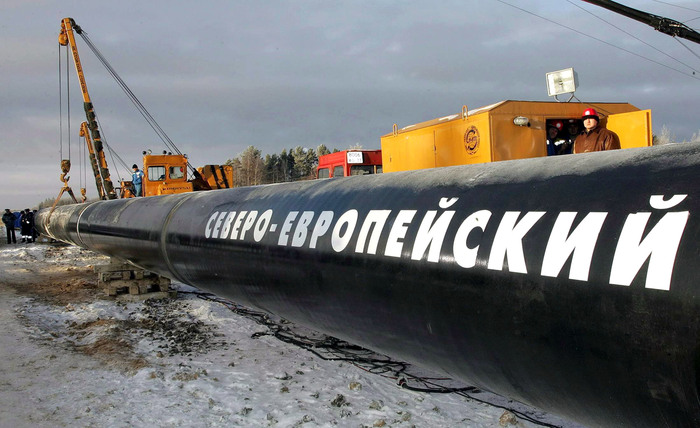Enlarge image
Workers on a gas pipeline in Ukraine (archive image): Prices have risen sharply
Photo: SERGEY DOLZHENKO / EPA
There was a huge increase in energy prices at all economic levels in February - and this despite the fact that the current price development after Russia's attack on Ukraine is not yet included in the results.
As reported by the Federal Statistical Office, imported energy was more than twice as expensive in February as in the same month last year, up 129.5 percent.
"The uncertainties on the energy markets and the tense supply situation with natural gas before Russia attacked Ukraine" contributed to the high energy price increases.
Domestically generated energy cost 68 percent more than a year earlier.
Consumers had to pay 22.5 percent more for household energy and fuel than in February 2021.
According to the statisticians, the development of natural gas prices was primarily responsible for the increase in energy prices at the upstream economic levels.
Imported natural gas was three and a half times more expensive in February 2022 than a year earlier (up 256.5 percent).
Natural gas in distribution cost 125.4 percent more than a year earlier across all customer groups.
According to the statisticians, the strong price increases for natural gas had an effect “above all on industrial customers and resellers”.
These are companies that buy natural gas and sell it to power plants, industry, trade and commerce, and household customers.
In February, resellers had to pay 143.8 percent more for natural gas than a year earlier, and industrial customers even 194.9 percent.
According to the Federal Office, the stock exchange listings for natural gas were more than four and a half times as high as in February 2021 (plus 358.8 percent).
High gas prices also make electricity more expensive
In the years 2020 and 2021, the price development for natural gas was strongly influenced by the economic slump caused by the corona pandemic and the rapid recovery of the economy, explained the Federal Office.
In the past few months, uncertainties before Russia's attack on Ukraine have increased.
The already tense situation has also been exacerbated by the low level of gas storage in Germany.
"The current price developments after Russia's attack on Ukraine are not yet included in the results," added the Federal Office.
The high price increases for natural gas also led to higher electricity prices in February – primarily due to the dependence of electricity generation on natural gas.
The producer prices for electricity were therefore 66.5 percent above the level in February 2021 across all customer groups.
Here, too, the price increases had different effects on the individual customer groups.
While redistributors – i.e. companies that buy electricity and sell it to industry, trade and commerce as well as household customers – had to pay 117.6 percent more than a year earlier, prices for industrial customers rose by 66.2 percent.
According to the statisticians, electricity for private households cost 13 percent more than in February 2021.
Imported oil cost 70.3 percent more in February than in the same month last year.
Consumers had to pay 52.6 percent more for light heating oil than in the same month last year, 29.4 percent for diesel fuel and 24.2 percent for petrol.
Researchers warn of an abrupt gas stop
Economic researchers expect that the effects of the Ukraine war and the high energy prices will have a significant impact on economic development.
The IMK research institute of the Hans Böckler Foundation assumes that the German economy will grow much more slowly this year or even shrink.
In the basic scenario, the experts close to the trade unions expect gross domestic product (GDP) to increase by 2.1 percent in their new forecast.
On the other hand, in a less favorable risk scenario with much higher energy prices, the economy would experience a mild recession and could contract by 0.3 percent.
In December, the IMK had still expected growth of 4.5 percent for 2022.
In 2021, German GDP had increased by 2.9 percent.
The Russian invasion of Ukraine abruptly blocked the path to economic recovery, said IMK Scientific Director Sebastian Dullien.
The economic picture for 2022 was no longer shaped by the slow but continuous easing of the corona-related supply bottlenecks and significant growth in private consumption, but by dramatically rising energy prices, extraordinarily high inflation rates, new strains on supply chains and great uncertainty: "This is slowing down private consumption, foreign trade and the willingness of companies to invest.«
According to the IMK, an abrupt interruption of energy supplies from Russia, whether due to a German embargo or a Russian supply freeze, would cause a deep recession in Germany this year.
In this case, GDP would shrink significantly more than in the risk scenario.
»Basically, an energy embargo would of course be a political decision that involves numerous considerations.
However, we want to point out that the economic and social consequences would most likely be serious and that economic policy must be ready to react accordingly," said Dullien.
mmq/AFP/Reuters/dpa




/cloudfront-eu-central-1.images.arcpublishing.com/prisa/MN66YGPQPRILE3TOGBKUQ35FWI.jpg)



